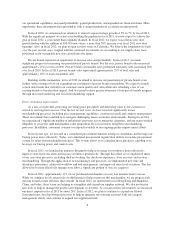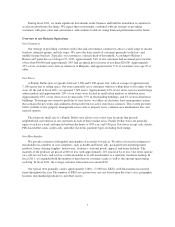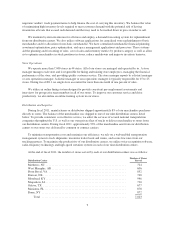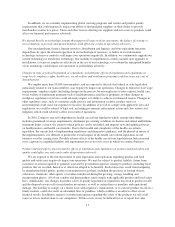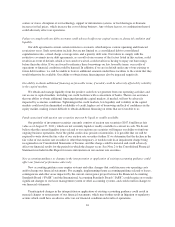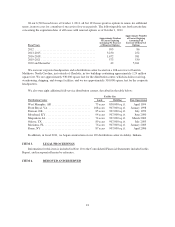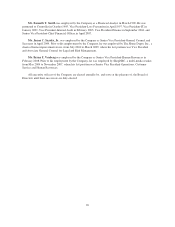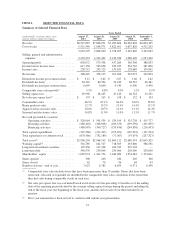Family Dollar 2011 Annual Report Download - page 20
Download and view the complete annual report
Please find page 20 of the 2011 Family Dollar annual report below. You can navigate through the pages in the report by either clicking on the pages listed below, or by using the keyword search tool below to find specific information within the annual report.centers or stores, disruption of our technology support or information systems, or fuel shortages or dramatic
increases in fuel prices, which increase the cost of doing business. Any of these factors, or combination thereof,
could adversely affect our operations.
Failure to comply with our debt covenants could adversely affect our capital resources, financial condition and
liquidity.
Our debt agreements contain certain restrictive covenants, which impose various operating and financial
restrictions on us. Such restrictions include, but are not limited to, a consolidated debt to consolidated
capitalization ratio, a fixed charge coverage ratio, and a priority debt ratio. Our failure to comply with the
restrictive covenants in our debt agreements, as a result of one or more of the factors listed in this section, could
result in an event of default, which, if not cured or waived, could result in us having to repay our borrowings
before their due dates. If we are forced to refinance these borrowings on less favorable terms, our results of
operations or financial condition could be harmed. In addition, if we are in default under any of our existing or
future debt facilities, we will be unable to borrow additional amounts under those facilities to the extent that they
would otherwise be available. Our ability to obtain future financing may also be impacted negatively.
Our ability to obtain additional financing on favorable terms, if needed, could be adversely affected by volatility
in the capital markets.
We obtain and manage liquidity from the positive cash flow we generate from our operating activities and
our access to capital markets, including our credit facilities with a consortium of banks. There is no assurance
that our ability to obtain additional financing through the capital markets, if needed, will not be adversely
impacted by economic conditions. Tightening in the credit markets, low liquidity and volatility in the capital
markets could result in diminished availability of credit, higher cost of borrowing and lack of confidence in the
equity market, making it more difficult to obtain additional financing on terms that are favorable to us.
Funds associated with auction rate securities may not be liquid or readily available.
Our portfolio of investment securities currently consists of auction rate securities ($107.6 million at fair
value as of August 27, 2011), which are not currently liquid or readily available to convert to cash. We do not
believe that the current liquidity issues related to our auction rate securities will impact our ability to fund our
ongoing business operations, but if the global credit crisis persists or intensifies, it is possible that we will be
required to write down the fair value of our auction rate securities further. If we determine that the decline in the
fair value of our auction rate securities is other than temporary, it would result in an impairment charge being
recognized in our Consolidated Statements of Income, and this charge could be material and could adversely
affect our financial results for the periods in which the charges occur. See Note 2 to the Consolidated Financial
Statements included in this Report for more information on our auction rate securities.
New accounting guidance or changes in the interpretation or application of existing accounting guidance could
affect our financial performance adversely.
New accounting guidance may require systems and other changes that could increase our operating costs
and/or change our financial statements. For example, implementing future accounting guidance related to leases,
contingencies and other areas impacted by the current convergence project between the Financial Accounting
Standards Board (“FASB”) and the International Accounting Standards Board (“IASB”) could require us to make
significant changes to our lease management system or other accounting systems, and could result in changes to
our financial statements.
Unanticipated changes in the interpretation or application of existing accounting guidance could result in
material charges or restatements of our financial statements, which may further result in litigation or regulatory
actions which could have an adverse effect on our financial condition and results of operations.
16


